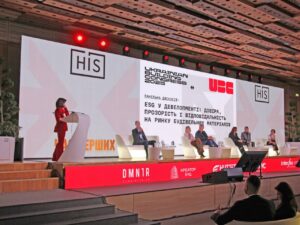
Engineering and construction company Rauta will launch sandwich panels, ventilated facades, and roofing materials made from “green” steel on the Ukrainian market next year, Rauta Director Andriy Ozeychuk announced during a panel discussion at the 5th Ukrainian Construction Congress in Kyiv on Friday.
“In 2026, Rauta will launch sandwich panels, ventilated facades, and roofing materials made from ‘green’ steel, which is produced using hydrogen, electricity, and biogas instead of fossil fuels. The residual product of this production process is not carbon dioxide, but water,” he said, citing an example of the company’s implementation of ESG principles (Environmental, Social, Governance – environmental, social and corporate responsibility).
According to him, the use of “green” steel, in particular, will significantly reduce the amount of embodied carbon and increase the number of points when certifying a building according to the LEED and BREEAM environmental systems.
Rauta systematically implements key ESG principles in its activities, because a transparent corporate culture and reputation are important to the company’s customers. “The projects implemented by our company always incorporate solutions that comply with ESG principles. For example, the Energy series’ airtight technology and sandwich panels reduce operational carbon and increase the sustainability of the facility,” says Ozeychuk.
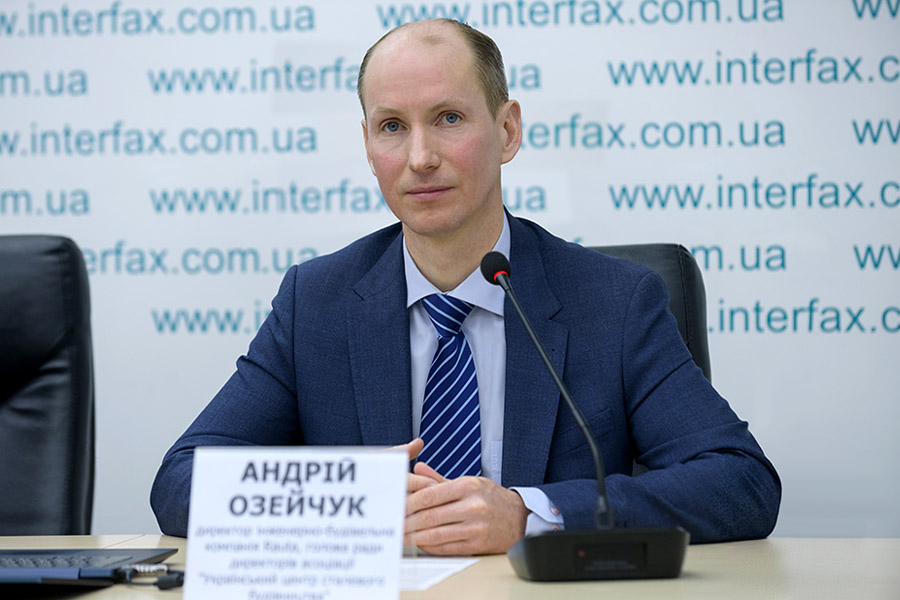
In 2022, Rauta was the first in Ukraine to introduce Environmental Product Declarations (EPDs) for building envelopes. The company is also actively involved in social projects: it partners with architectural competitions, provides grants for training young architects at InLab and Plus Minus schools, has set up a training stand in a specialized energy conservation auditorium at KNUSA, and has launched an educational project on sustainable design.
The expert noted that the advantage of steel solutions for the customer is the speed of project implementation and the ability to create large-span spaces. If necessary, steel frames can be relatively easily relocated or 100% recycled as scrap metal, which significantly increases their value for the customer compared to reinforced concrete solutions.
Ozeychuk stated that European construction customers implementing projects in Ukraine are not only willing to pay for steel solutions, but also often insist on the use of more environmentally friendly and energy-efficient materials.
“This is due to a more conscious attitude towards ecology and construction experience in the EU, where the European Energy Performance of Buildings Directive (EPBD) is in force, which sets requirements for improving the energy efficiency of existing and new buildings, which directly affects the criteria for selecting materials. Unfortunately, Ukrainian construction customers mainly look at low prices rather than environmental or quality characteristics,” he said.
According to his forecast, if Ukraine implements the European Directive, the demand for materials with better thermal and environmental characteristics will increase. “This will increase competition between Ukrainian and European manufacturers and force the former to invest in modern production processes to improve the environmental friendliness and energy efficiency of their products,” Ozeychuk believes.
Rauta is a leader in the Ukrainian steel construction market and a member of the European Construction Industry Association. The company provides design, manufacturing, and installation solutions in accordance with current EU standards. The company is licensed to perform construction work with medium and significant consequences (CC2, CC3). According to the Unified State Register, Andriy Ozeychuk owns 100% of the company’s authorized capital.
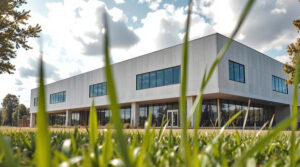
Where is the greatest potential for reducing carbon dioxide emissions, and which construction technologies can maximise the energy efficiency of buildings?
The construction and operation of buildings accounts for 39% of global CO2 emissions, of which 28% comes from operational emissions and the energy required for heating, cooling, and power supply, and 11% comes from the manufacture of materials and construction.
In the EU, only 25% of buildings are considered energy efficient, while in Ukraine the share of such buildings is about 5%. Consequently, the greatest potential for reducing carbon emissions lies in improving the energy efficiency of buildings and reducing the use of fossil fuels in the manufacture of building materials.
The use of energy-efficient building envelopes in combination with technologies such as heat pumps, renewable heat and electricity sources is the best way to create energy-independent buildings and achieve climate neutrality.
Rauta offers energy-efficient technologies using Ruukki products to create energy-efficient buildings.
Thanks to the special configuration of the joints and the presence of an EPDM seal in the sandwich panel locks, maximum airtightness of q50≤1 m3/(m2h) is achieved and energy consumption is reduced by up to 20% compared to conventional panels.
Highly efficient building envelopes made of Ruukki sandwich panels not only reduce overall carbon dioxide emissions and operating costs, but also provide greater comfort for people, enhance the company’s image, and increase the value of the building.
The use of Ruukki’s energy-efficient sandwich panels with special accessories and additional joint sealing can reduce a building’s energy consumption by up to 30%.
Green steel products
In 2023, Ruukki became the first company in the world to start producing sandwich panels and ventilated facade cladding from green steel, which is produced using hydrogen, electricity, and biogas instead of fossil fuels. The residual product of this production process is water, not carbon dioxide.
For facades and roofs that will be used in highly aggressive environments, Ruukki offers special Hiarc and Pural coatings, which provide excellent resistance to ultraviolet radiation, have increased resistance to dirt and scratches, and are also capable of reducing the heating temperature of the surface of enclosing structures.
Under the same conditions, energy-reflective coatings heat up 23% less than conventional coatings. This further reduces the amount of energy required to heat or cool rooms.
Rauta’s solution is a rooftop solar power plant that includes an enclosure made of Ruukki roof sandwich panels and modern monocrystalline solar panels with a set of special mounts.
Currently, the return on investment in RoofSolar for commercial buildings is 3.5-4 years.
Today, construction expertise is measured not in tons of concrete and steel, but in how little the construction and operation of buildings affect the environment. Improving construction technologies and using more energy-efficient materials and structures are essential steps for developers to take to preserve the planet.
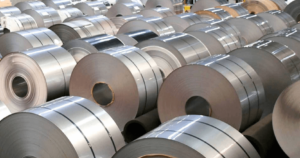
Global demand for steel in 2025 will remain at the previous year’s level — about 1.748 billion tons, after a 1.6% decline in 2024. These figures are given in the short-term forecast of the World Steel Association (Worldsteel) — Short Range Outlook (SRO).
In 2026, according to experts, demand will grow by 1.3% to 1.772 billion tons, driven by recovery in Europe, India, and the rapidly developing countries of Asia, the Middle East, and Africa.
According to Worldsteel’s forecast, in the CIS countries, including Ukraine, demand for steel will decline by 5.2% in 2025, to 56.1 million tons, and by another 1.7% in 2026, to 55.2 million tons.
At the same time, India will retain its status as the world’s fastest-growing steel market, with growth of around 9% annually in 2025-2026. Already next year, steel consumption in India will be almost 75 million tons higher than in 2020.
In developing countries (excluding China), demand for steel will increase by 3.4% in 2025 and by 4.7% in 2026, driven by active economic development in ASEAN countries, as well as in Saudi Arabia and Egypt.
In Africa, steel consumption is growing by an average of 5.5% annually, reaching 41 million tons in 2025 — the highest level in the last decade. Growth is driven by investments in construction and improved macroeconomic indicators.
Andriy Ozeychuk, Chairman of the Board of Directors of the Ukrainian Steel Construction Center and Director of Rauta, commented on the market situation and prospects for the Ukrainian steel sector.
“The Ukrainian steel market in 2025–2026 will be shaped by the recovery of domestic demand in construction and machine building, as well as the growth of exports of metal structures to the EU. We predict that demand for steel in Ukraine may grow by 6-8% in 2026 due to infrastructure and industrial recovery projects,” Ozeychuk said.
According to him, the steel construction sector will be the driver of this growth:
“The use of metal structures will accelerate the restoration of logistics, industrial, and infrastructure facilities.”
Ozeychuk also stressed that the launch of joint programs with European partners in the field of “green” metallurgy, where Ukraine already has its first pilot initiatives for the production of steel with a low carbon footprint, could give the industry an additional boost.
According to the forecast, demand for steel in the EU+UK region will increase by 1.3% in 2025 and by 3.2% in 2026. This reflects the impact of increased investment in infrastructure and defense amid lower inflation and improved household incomes.
In the US, Worldsteel expects steel consumption to increase by 1.8% in both 2025 and 2026. The main drivers of growth will be government spending on infrastructure, a revival in housing construction, and private investment.
In China, steel demand will continue to decline, by approximately 2% in 2025, due to the prolonged downturn in the real estate market. In 2026, the rate of decline will slow to 1% as the construction sector is expected to bottom out.
Worldsteel warns that a more challenging global trade environment and financial pressure on local authorities could further limit infrastructure investment and reduce demand.
According to Alfonso Hidalgo de Calcerrada, chief economist of the Spanish Steel Manufacturers Association (UNESID) and chairman of the Worldsteel Economic Committee, the organization is “cautiously optimistic” about the market outlook:
“Despite trade disputes and uncertainty, we believe that global steel demand will bottom out in 2025 and show moderate growth in 2026,” the expert said.
He added that this will be facilitated by the resilience of the global economy, growth in infrastructure investment, and easing financial conditions. At the same time, the sector continues to be pressured by high costs, trade barriers, and geopolitical risks.
Worldsteel’s forecast emphasizes that the decline in demand in China is offset by strong growth in India and developing countries, where a new center of global steel production is emerging.
In addition, the protective measures introduced by the European Union — reducing duty-free import quotas and increasing customs duties to 50% — may change the balance between EU producers and exporters from Asia and Eastern Europe.
For more information on the largest steel producers and global industry trends, see the Experts Club video analysis review available on YouTube: Experts Club — Leaders of the global steel industry 1990–2024
CHINA, EU, EXPERTS CLUB, global economy, INDIA, OZEYCHUK, RAUTA, USA, World Steel, WORLDSTEEL
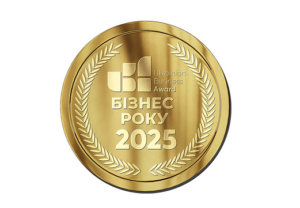
The Ukrainian Business Award is an independent award that recognizes the best companies in Ukraine for their contribution to the economy and society. The winners are selected based on objective data and expert opinions.
The award is a confirmation of Rauta’s leadership in the construction market and its contribution to the development of the Ukrainian economy, as the company continues to operate steadily, introduce new technologies and actively participate in the restoration of destroyed buildings during the full-scale invasion. Since 2022, the company has participated in the reconstruction of the Retroville shopping center, two supermarkets and the Novus logistics terminal, Forum Park Plaza in Kyiv, Pinocchio kindergarten in Bucha, and a truck service station in Odesa.
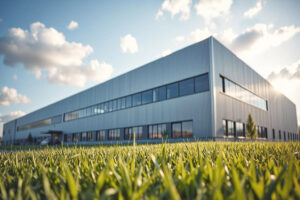
Ruukki ventilated facades now have a Global Warming Potential (GWP) rating, allowing architects and customers to monitor the environmental performance of materials and improve the sustainability of construction projects, according to Rauta.
GWP, expressed in kilograms of CO₂ equivalent per square meter, makes it possible to compare the environmental performance of different building materials and assess their impact on climate change within the life cycle assessment of a building.
“The availability of GWP allows customers to make informed choices in favor of the most environmentally friendly materials and earn additional points in certification according to international environmental standards LEED and BREEAM,” said Rauta Director Andriy Ozeychuk.
GWP data is available on the pages of the corresponding Ruukki ventilated facade products.
Rauta is a Ukrainian company specializing in the supply and implementation of modern building solutions using sandwich panels, steel structures, and energy-efficient technologies.
As the official representative of Ruukki in Ukraine, the company implements projects in industrial, commercial, and civil construction.
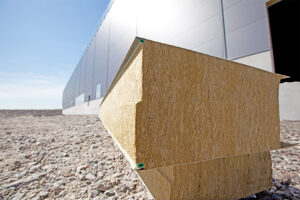
Rauta has said that Ruukki sandwich panels can last over 100 years. This conclusion is backed up by test reports on the filler and polymer-coated steel, the company said.
According to Rauta, the key factors affecting the durability of sandwich panels are the correct selection of the polymer coating for steel cladding in accordance with the corrosion aggressiveness category of the environment, as well as the accurate calculation of the panels to ensure the proper load-bearing capacity of the enclosing structures.
Rauta is a Ukrainian company specializing in the supply and implementation of modern construction solutions using sandwich panels, steel structures, and energy-efficient technologies.
As the official representative of Ruukki in Ukraine, the company implements projects in industrial, commercial, and civil construction.